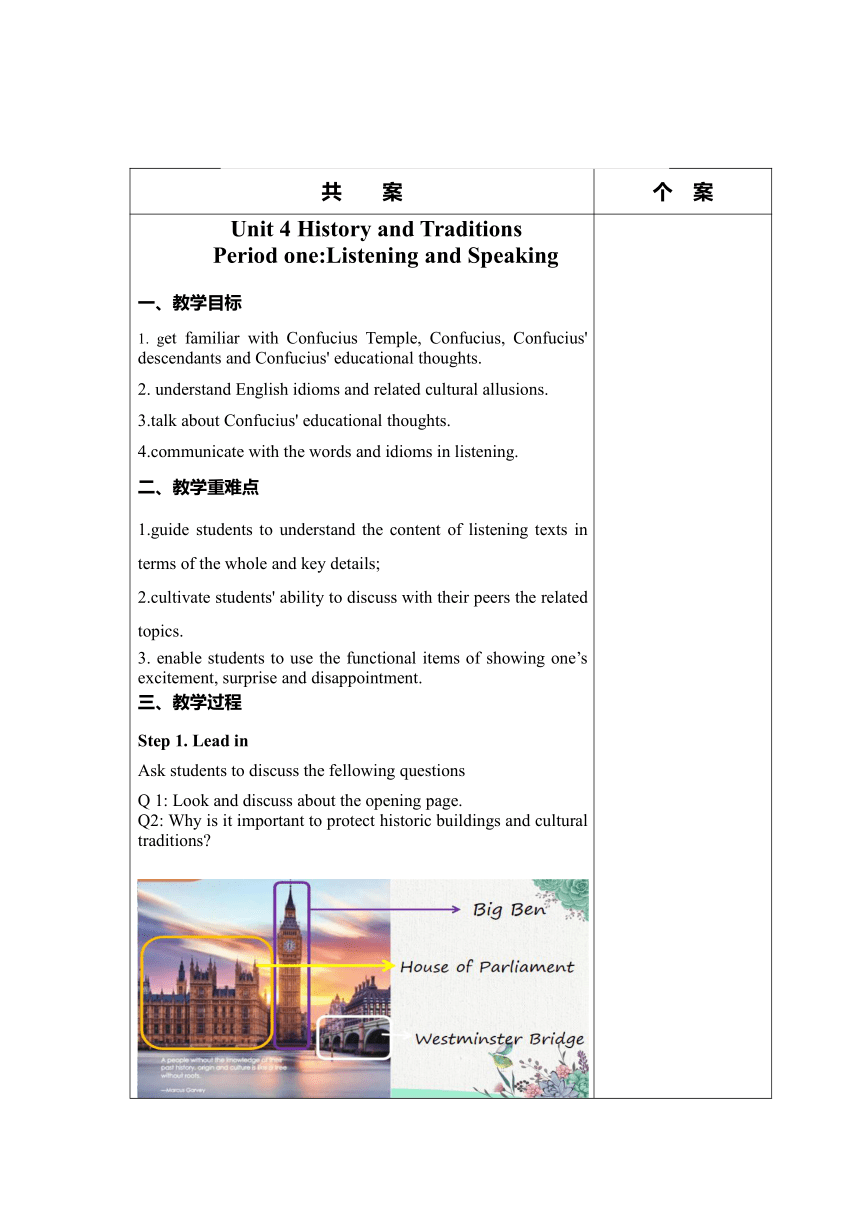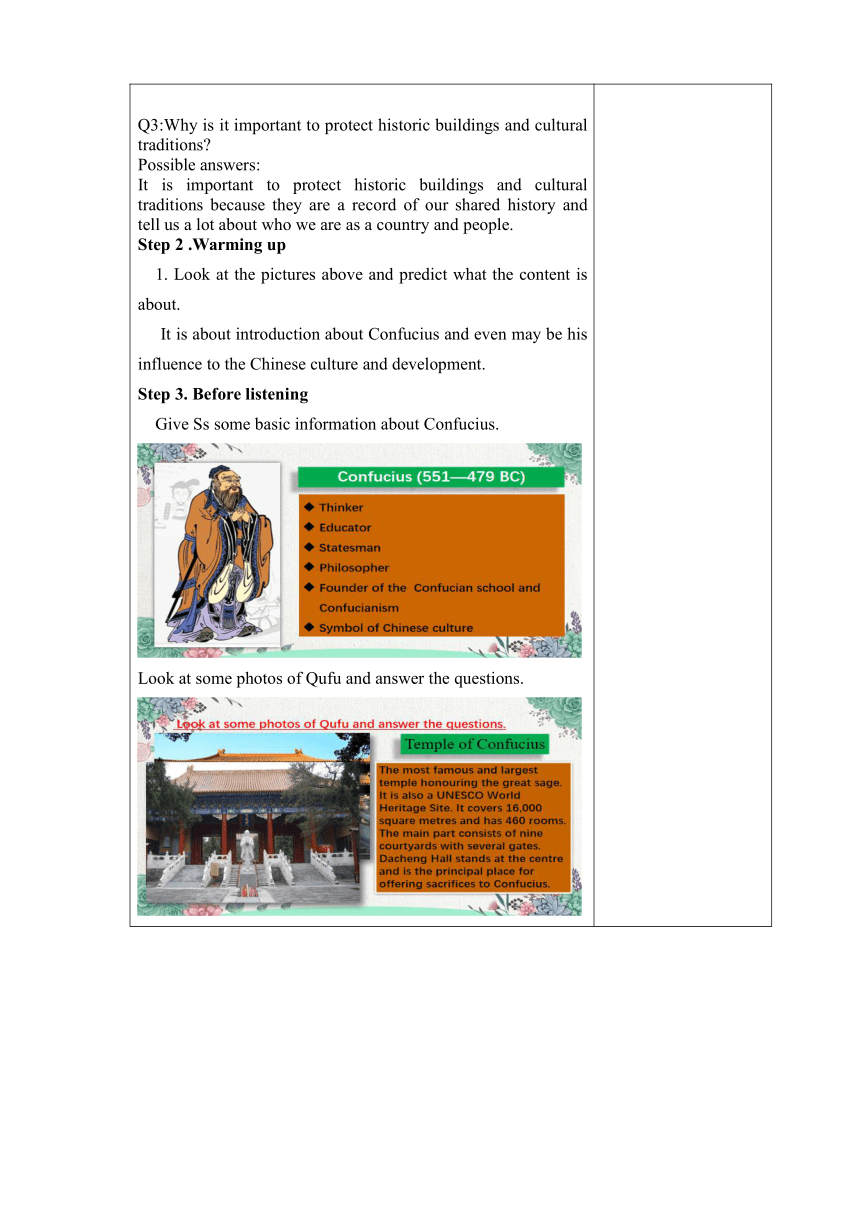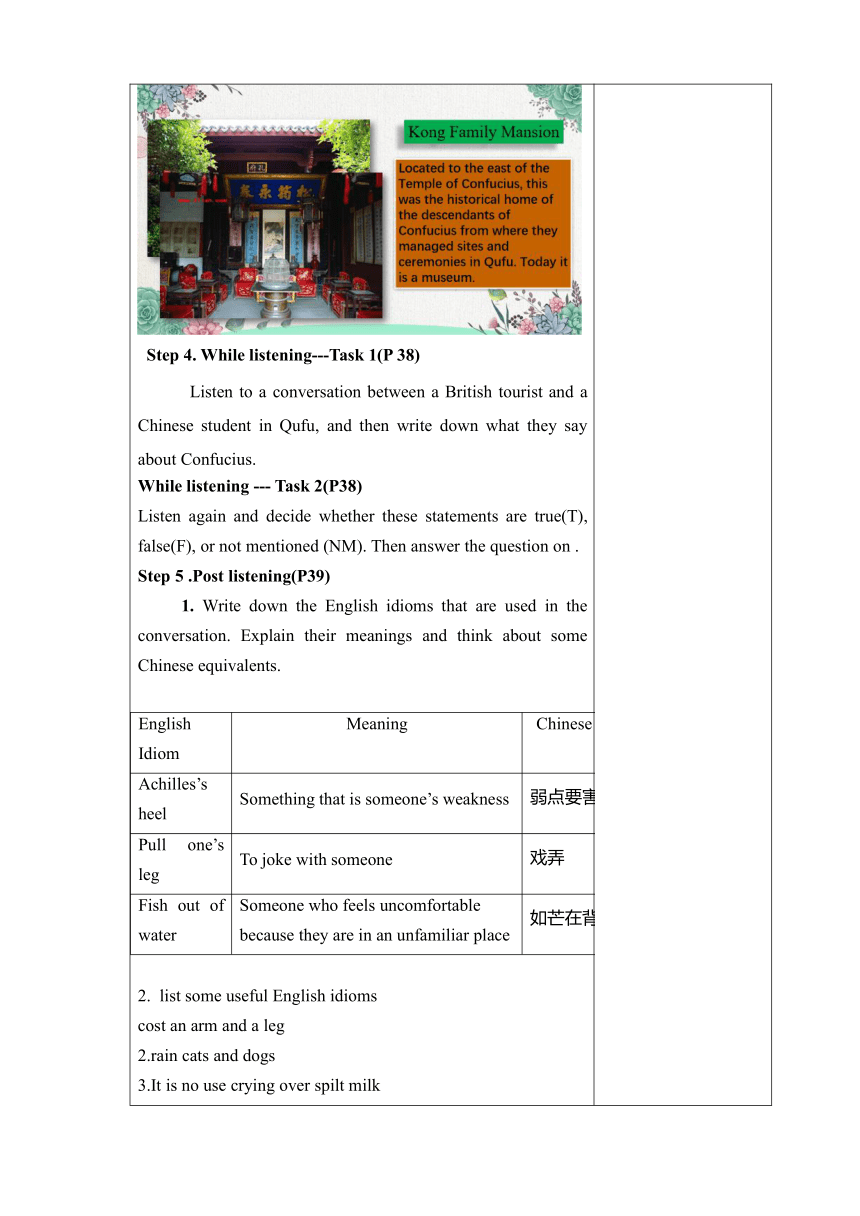人教版(2019)必修第二册Unit 4 History and Traditions Listening and speaking教案(表格式)
文档属性
| 名称 | 人教版(2019)必修第二册Unit 4 History and Traditions Listening and speaking教案(表格式) |  | |
| 格式 | docx | ||
| 文件大小 | 2.8MB | ||
| 资源类型 | 教案 | ||
| 版本资源 | 人教版(2019) | ||
| 科目 | 英语 | ||
| 更新时间 | 2022-03-21 21:44:52 | ||
图片预览



文档简介
共 案 个 案
Unit 4 History and Traditions Period one:Listening and Speaking 教学目标 1. get familiar with Confucius Temple, Confucius, Confucius' descendants and Confucius' educational thoughts. 2. understand English idioms and related cultural allusions. 3.talk about Confucius' educational thoughts. 4.communicate with the words and idioms in listening. 二、教学重难点 1.guide students to understand the content of listening texts in terms of the whole and key details; 2.cultivate students' ability to discuss with their peers the related topics. 3. enable students to use the functional items of showing one’s excitement, surprise and disappointment. 三、教学过程 Step 1. Lead in Ask students to discuss the fellowing questions Q 1: Look and discuss about the opening page. Q2: Why is it important to protect historic buildings and cultural traditions Q3:Why is it important to protect historic buildings and cultural traditions Possible answers: It is important to protect historic buildings and cultural traditions because they are a record of our shared history and tell us a lot about who we are as a country and people. Step 2 .Warming up 1. Look at the pictures above and predict what the content is about. It is about introduction about Confucius and even may be his influence to the Chinese culture and development. Step 3. Before listening Give Ss some basic information about Confucius. Look at some photos of Qufu and answer the questions. Step 4. While listening---Task 1(P 38) Listen to a conversation between a British tourist and a Chinese student in Qufu, and then write down what they say about Confucius. While listening --- Task 2(P38) Listen again and decide whether these statements are true(T), false(F), or not mentioned (NM). Then answer the question on . Step 5 .Post listening(P39) 1. Write down the English idioms that are used in the conversation. Explain their meanings and think about some Chinese equivalents. English IdiomMeaningChinese equivalentAchilles’s heelSomething that is someone’s weakness弱点要害Pull one’s legTo joke with someone戏弄Fish out of waterSomeone who feels uncomfortable because they are in an unfamiliar place如芒在背
list some useful English idioms cost an arm and a leg 2.rain cats and dogs 3.It is no use crying over spilt milk 4.There is no such thing as free lunch 5.Love me ,love my dog 6.A cat on hot bricks 7.When in Rome do as the Romans do Step 6. Speaking 1.Draw a mind map to sort out the information about Confucius in this class and list some examples about his ideas on education. 2.Discuss the questions in groups. What do you know about Confucius’ idea on education Think of two or three examples. Education was one of Confucius’ core values. He believed learning about the past would help us know the future. He also thought education helped our confidence which would help bring peace and prosperity. He also thought it was important to use and apply what we have learnt in our education. What else do you know about Confucius and his philosophy Confucius was a great thinker, educator, and philosopher. His principles had a great influence on Chinese traditions and beliefs. He believed strongly in strong family loyalty and respect for others. Think about a historic site that you have visited, and give an introduction to its history and importance. I visited the Mogao Caves with my family recently. They are famous for their amazing paintings and statues. They were constructed over many dynasties and are an important record of tradition and belief in China during that time. Step7. Summary 1. by the way ______ 2. in fact__________ 3. pull my leg ________ 4. be related to__________ 5.pay respects to_______ 6. do a research project_______ 7. talk about__________ 8. lead to__________ 9. over there_______ 10. get sth done _______ Step8. Homework 1.Share what you have learned in this class with your friends. 2.Find and research more well -known English idioms and proverbs. 教后反思(不少于100字)
Unit 4 History and Traditions Period one:Listening and Speaking 教学目标 1. get familiar with Confucius Temple, Confucius, Confucius' descendants and Confucius' educational thoughts. 2. understand English idioms and related cultural allusions. 3.talk about Confucius' educational thoughts. 4.communicate with the words and idioms in listening. 二、教学重难点 1.guide students to understand the content of listening texts in terms of the whole and key details; 2.cultivate students' ability to discuss with their peers the related topics. 3. enable students to use the functional items of showing one’s excitement, surprise and disappointment. 三、教学过程 Step 1. Lead in Ask students to discuss the fellowing questions Q 1: Look and discuss about the opening page. Q2: Why is it important to protect historic buildings and cultural traditions Q3:Why is it important to protect historic buildings and cultural traditions Possible answers: It is important to protect historic buildings and cultural traditions because they are a record of our shared history and tell us a lot about who we are as a country and people. Step 2 .Warming up 1. Look at the pictures above and predict what the content is about. It is about introduction about Confucius and even may be his influence to the Chinese culture and development. Step 3. Before listening Give Ss some basic information about Confucius. Look at some photos of Qufu and answer the questions. Step 4. While listening---Task 1(P 38) Listen to a conversation between a British tourist and a Chinese student in Qufu, and then write down what they say about Confucius. While listening --- Task 2(P38) Listen again and decide whether these statements are true(T), false(F), or not mentioned (NM). Then answer the question on . Step 5 .Post listening(P39) 1. Write down the English idioms that are used in the conversation. Explain their meanings and think about some Chinese equivalents. English IdiomMeaningChinese equivalentAchilles’s heelSomething that is someone’s weakness弱点要害Pull one’s legTo joke with someone戏弄Fish out of waterSomeone who feels uncomfortable because they are in an unfamiliar place如芒在背
list some useful English idioms cost an arm and a leg 2.rain cats and dogs 3.It is no use crying over spilt milk 4.There is no such thing as free lunch 5.Love me ,love my dog 6.A cat on hot bricks 7.When in Rome do as the Romans do Step 6. Speaking 1.Draw a mind map to sort out the information about Confucius in this class and list some examples about his ideas on education. 2.Discuss the questions in groups. What do you know about Confucius’ idea on education Think of two or three examples. Education was one of Confucius’ core values. He believed learning about the past would help us know the future. He also thought education helped our confidence which would help bring peace and prosperity. He also thought it was important to use and apply what we have learnt in our education. What else do you know about Confucius and his philosophy Confucius was a great thinker, educator, and philosopher. His principles had a great influence on Chinese traditions and beliefs. He believed strongly in strong family loyalty and respect for others. Think about a historic site that you have visited, and give an introduction to its history and importance. I visited the Mogao Caves with my family recently. They are famous for their amazing paintings and statues. They were constructed over many dynasties and are an important record of tradition and belief in China during that time. Step7. Summary 1. by the way ______ 2. in fact__________ 3. pull my leg ________ 4. be related to__________ 5.pay respects to_______ 6. do a research project_______ 7. talk about__________ 8. lead to__________ 9. over there_______ 10. get sth done _______ Step8. Homework 1.Share what you have learned in this class with your friends. 2.Find and research more well -known English idioms and proverbs. 教后反思(不少于100字)
